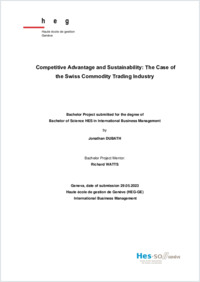Competitive advantage and sustainability : the case of the Swiss commodity trading industry
SONAR|HES-SO
- Dubath, Jonathan
- Watts, Richard (Degree supervisor)
- Genève : Haute école de gestion de Genève
117 p.
Bachelor of Sciences HES in International Business Management: Haute école de gestion de Genève, 2023
English
Switzerland is a key hub in the global trade of commodities and boasts an unparalleled concentration of firms active in the industry. In recent years, the way in which economic activity is perceived by its participants has shifted to include much stronger concern for environmental footprint. Various pressures - regulatory, financial, commercial and public - are applied on firms to reduce their emissions intensity and broader ecological impact.
The thesis aims at understanding how traders based in Switzerland can gain a competitive advantage by embracing these calls to sustainability. Eleven semi-directed interviews were conducted and are the basis for many of the claims made and insights developed in this work. Academic literature and the sustainability reports of trading firms complete this picture.
Whilst regulatory and public exposure risks do shape traders' behaviours to an extent, the pressure applied by financial lenders on firms to display environmental performance is shown to be the most potent. A survey of the available solutions and opportunities is followed by an assessment of the current level of action of major trading firms.
Embedding sustainability in one's business model is here linked to three main advantages: privileged access to financing, potential for differentiation and reputational benefits. The types of approaches which companies may adopt in response to these incentives are laid out. Concepts of game theory are then used to map the decision faced by traders and establish the presence of a potential first mover advantage in capturing these benefits. Uncertainty is demonstrated to be one of the main causes of inaction. In this context, a state's signalling of strong regulatory intent is introduced as a probable pre-condition for industry change. The notion of commitment is also explored and pointed to as a pragmatic way of aligning a company's objectives with sustainable goals as well as reducing reputational and regulatory risks.
The findings of this work confirm that commodity trading firms have the opportunity to gain a competitive advantage by embracing sustainability. A framework which can be used by firms to define their strategy regarding these issues is proposed along with a set of factors to consider.
The thesis aims at understanding how traders based in Switzerland can gain a competitive advantage by embracing these calls to sustainability. Eleven semi-directed interviews were conducted and are the basis for many of the claims made and insights developed in this work. Academic literature and the sustainability reports of trading firms complete this picture.
Whilst regulatory and public exposure risks do shape traders' behaviours to an extent, the pressure applied by financial lenders on firms to display environmental performance is shown to be the most potent. A survey of the available solutions and opportunities is followed by an assessment of the current level of action of major trading firms.
Embedding sustainability in one's business model is here linked to three main advantages: privileged access to financing, potential for differentiation and reputational benefits. The types of approaches which companies may adopt in response to these incentives are laid out. Concepts of game theory are then used to map the decision faced by traders and establish the presence of a potential first mover advantage in capturing these benefits. Uncertainty is demonstrated to be one of the main causes of inaction. In this context, a state's signalling of strong regulatory intent is introduced as a probable pre-condition for industry change. The notion of commitment is also explored and pointed to as a pragmatic way of aligning a company's objectives with sustainable goals as well as reducing reputational and regulatory risks.
The findings of this work confirm that commodity trading firms have the opportunity to gain a competitive advantage by embracing sustainability. A framework which can be used by firms to define their strategy regarding these issues is proposed along with a set of factors to consider.
- Language
-
- English
- Classification
- Economics
- Notes
-
- Haute école de gestion Genève
- International Business Management
- hesso:hegge
- Persistent URL
- https://folia.unifr.ch/global/documents/327644
Statistics
Document views: 244
File downloads:
- IBMBT_23_DUBATH_Jonathan_VF.pdf: 364
